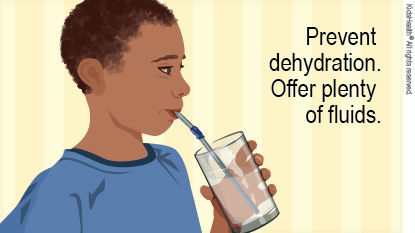Chronic Diarrhea: How to Care for Your Child
Diarrhea is poop that's loose, watery, or happens a lot. Diarrhea that lasts for more than a few weeks is called chronic diarrhea. Kids who have chronic diarrhea can lose too much water (get dehydrated). Offer your child plenty of fluids to prevent dehydration.


-
Give an oral rehydration solution to replace lost fluids. It has the right amount of water, sugar, and salt for kids. Brand names include Pedialyte®, and Enfalyte® and many stores also have a store brand. You can buy it at drugstores or supermarkets without a prescription. You also can give frozen electrolyte pops.
-
Don't offer juice, sodas, or sports drinks. They can make diarrhea worse.
-
Only change your child's diet if told to by your health care provider. You may need to remove some foods (like greasy or fried foods and dairy products) from the diet. Ask if you should give foods high in probiotics ("good" bacteria), such as yogurt, to help with digestion.
-
Don't give medicine for the diarrhea unless your health care provider has prescribed it. Medicines that slow down diarrhea can cause problems like sleepiness or belly pain, and may be unsafe for kids and teens.
-
Sometimes germs cause chronic diarrhea, and can pass from person to person. Remind everyone in your family to wash their hands often and well. This is especially important after using the bathroom and before preparing or eating food.

Your child:
-
has diarrhea that gets worse
-
is losing weight or not gaining weight as expected
-
has belly pain that doesn't go away
-
has a fever
-
has poop with streaks of blood or mucus in it
-
has poop that looks black
-
seems to be getting sicker

Your child:
-
has severe belly pain
-
has a lot of blood in the poop (not just streaks) or the amount of blood is increasing
-
is very weak or pale
-
appears dehydrated; signs include drowsiness, dry or sticky mouth, sunken eyes, crying with few or no tears, or peeing less often (or having fewer wet diapers)

What causes chronic diarrhea? Many things can cause chronic diarrhea, including:
-
infections, because it can take several weeks for the intestines to heal after an infection
-
too much of some kinds of foods or drinks, such as too much juice
-
food allergies or intolerances, such as lactose intolerance
-
problems with the digestive system, such as celiac disease, irritable bowel syndrome, or inflammatory bowel disease (IBD)